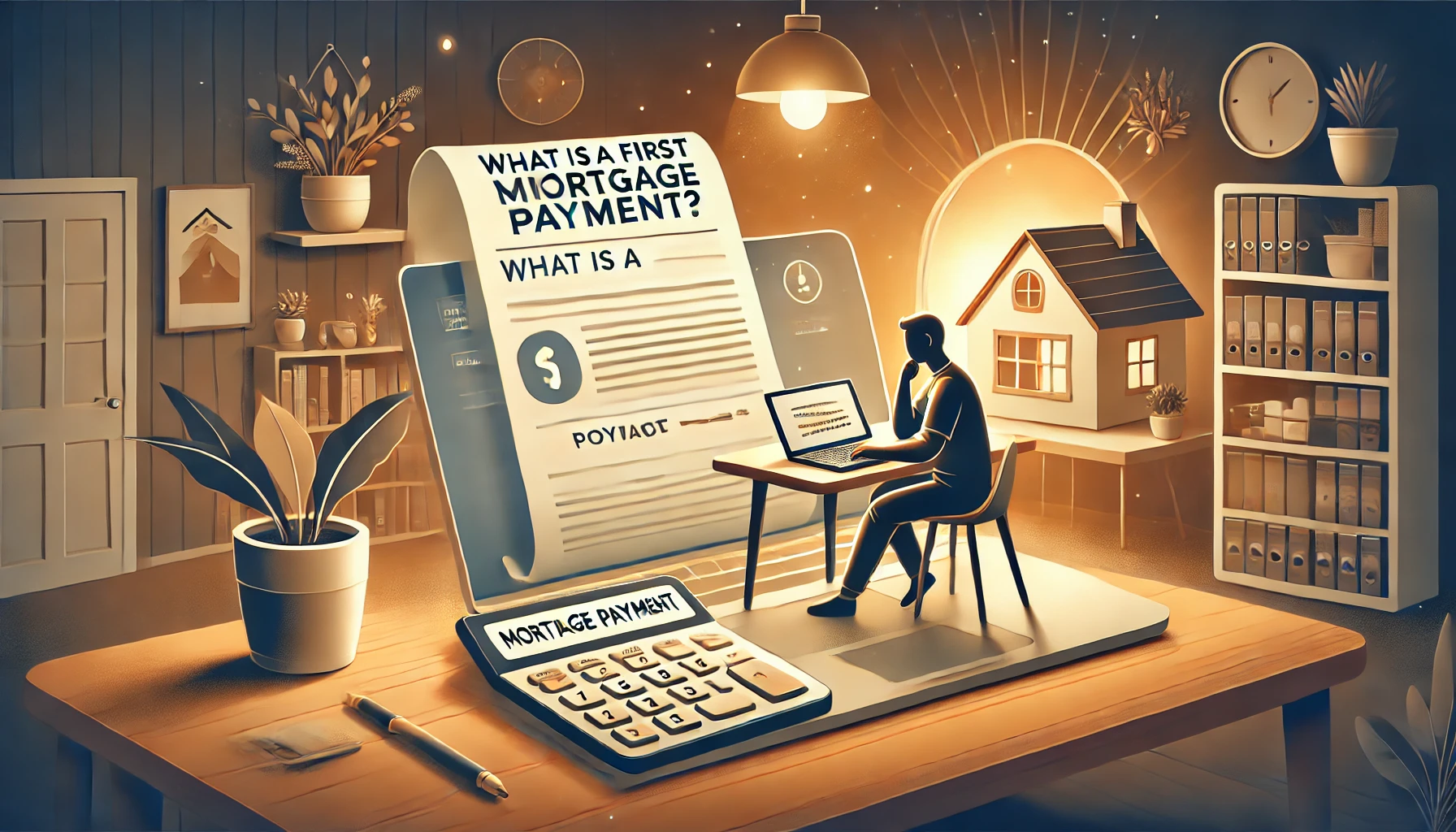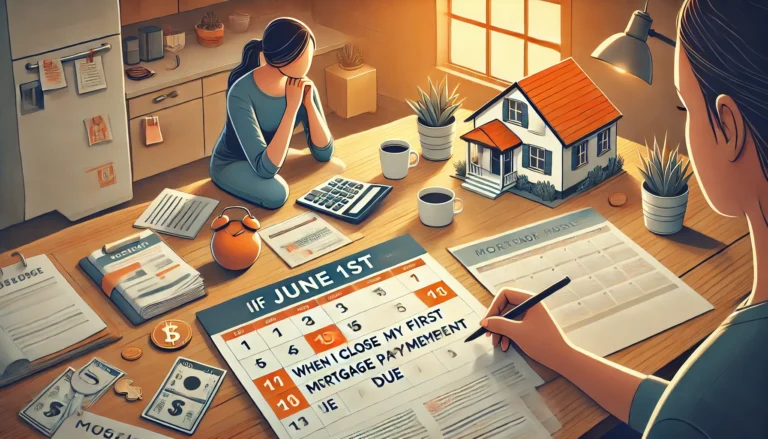Your first mortgage payment is typically due after you close on your mortgage. It often depends on how you time your closing. If you close early in the month, your payment due date may be further away, while a later closing may mean the payment comes due sooner. Using a mortgage calculator can help you understand the amount and what’s included in your loan contribution, making planning easier.
What Is a First Mortgage Payment?
A first loan payment is the initial loan repayment you make to your lender. It covers part of the principal and the mortgage interest. This payment is crucial because it sets the foundation for how you’ll make your home loan installment going forward. The first of the month is a common payment due date, but exact timing depends on when your closing occurs and the terms of your loan.
Why Your First Mortgage Payment Is Important
Your first mortgage payment is important as it ensures you start your loan on the right track. Paying on time helps you build a positive relationship with your lender and avoid late fees. It also helps you manage your budget by understanding how much to allocate for future payments. Carefully timing your closing and using a mortgage calculator can help ensure your first payment fits into your financial plans smoothly.
When Is the First Mortgage Payment Due?
Your first mortgage payment is typically due on the first day of the second month after you close on a home. If you close in the middle of the month, you usually don’t need to make the payment until the following month. Some lenders offer a grace period, but it’s important to understand when the payment due date is to avoid any late mortgage fees.

How the Closing Date Affects Your First Payment
The timing of your closing date determines when your first contribution payment is due. Typically, your first mortgage payment is due on the first day of the second month after closing. For example:
| Closing Date | First Payment Due |
|---|---|
| January 15 | March 1 |
| February 25 | April 1 |
| March 5 | May 1 |
If you close later in the month, you might not have to make a payment until the following month. Always refer to your first payment letter from your lender to confirm the exact due date and avoid late fees.
Calculating Your Mortgage Payment Due After Closing
After closing, calculating your mortgage payment due can help you plan your budget. This amount includes both the principal and interest. Your first payment typically comes due a month after your closing, but if you’re skipping a payment, make sure you understand how this will affect your loan terms. Use a mortgage calculator or consult your lender for accurate details on your next payment.
How to Make Your First Mortgage Payment
To make your first installment, you need to know when it’s due. Your first installment is payable on the first day of the month . If your payment is due on the first, make sure to pay by that date to avoid any late payment fees. Some lenders offer a grace period, but it’s best to pay on time to keep things simple.
Setting Up a Payment Plan with Your Mortgage Lender
Setting up a payment plan with your mortgage lender helps ensure you’re ready for your first payment. After closing, your lender will provide details about when the payment will be due. You can often choose to set up automatic payments to ensure your monthly loan installment is made on time. If you expect any issues, communicate with your lender right away.
Steps to Pay Your Mortgage on Time
To pay your mortgage on time, make sure you understand when your payment is due. Payments are typically pay on the first day of the month, and your first payment is due a month after closing. Always factor in any closing costs and use your mortgage lender’s grace period, if available. Setting reminders and budgeting can help you avoid late payments.
Breaking Down Your Mortgage Loan Payment
Your mortgage loan payment is divided into several parts, including principal and interest. The amount you pay each month will be outlined in your closing disclosure. Typically, your mortgage payment will be due on the first day of month, with your first payment due on the second month after closing. To ensure timely payments, make your payment at least three days before the due date of your first payment.
Principal Payment vs. Mortgage Interest
- Principal Payment:
- Reduces the loan balance
- Goes directly toward paying off the amount you borrowed
- Increases over time as you pay off your mortgage
- Mortgage Interest:
- Paid to the lender as the cost of borrowing money
- Decreases over time as the loan balance reduces
- Typically higher at the start of your mortgage and decreases with each payment
- How Payments Work:
- Early payments are mostly interest, with a smaller portion going toward principal
- As the loan balance decreases, more of your payment goes toward reducing the principal
- Skipping a payment can delay the reduction of both principal and interest
Factors That Impact Your Loan Payment Amount
Several factors affect the amount of your mortgage loan payment, including the interest rate, loan term, and down payment. The type of mortgage you choose also plays a role in determining your monthly payment. To ensure you get the best terms, always choose the right lender. If you’re closing on a new mortgage, your payment amount will be outlined in your closing disclosure. Expect your first home loan payment to be due a month after closing, and always plan ahead to make your payments on time.
Managing Your Payment at Closing
When you close on your mortgage, part of your closing costs may include the first payment. Your first payment would typically be due a month after closing. You’ll receive a first payment letter from your lender outlining the exact due date and payment amount. To avoid missing your dues, make sure to set up automatic payments from your bank account or manually make your loan payments on time.
What to Expect on the Due Date
Your first property installment is due on the first day of the month, typically a month after end. For example, if you close on your mortgage in September, your payment will likely be due on the first of October. Mortgage lenders offer a grace period, but it’s important to pay on time to avoid late fees. Always check your first payment letter for exact details.
Preparing for the Month You Close
When you close on a new mortgage, it’s important to be prepared for your first full home loan installment. Ensure that all closing costs are covered, and you’ve set up your mortgage account correctly. Payments will be due on the first day of the month after closing, so make sure to budget and set reminders to avoid missing your mortgage payment. Always make the payment at least three days before the due date.
Choosing the Right Mortgage for Your Needs
Choosing the right mortgage depends on your financial situation and goals. You’ll need to decide on the loan type, interest rate, and payment plan that fits your budget. Some options may allow you to pay off your mortgage early, while others offer lower monthly payments. Your first payment will be due the first of the month after closing, so it’s important to plan ahead for the first payment amount.
How to Find the Best Mortgage Lender
To find the best mortgage lender, start by researching reputable mortgage companies. Compare loan options and interest rates to make sure you’re getting the best deal. The lender should provide a first payment letter that clearly states when your first payment comes due. Make sure to choose a lender who offers clear terms and includes closing costs in the mortgage loan, so there are no surprises.
FAQ’S:
When is my first mortgage payment due?
Your first loan dues is typically due the first of the month.
What should I expect in my first payment letter?
Your first payment letter outlines the due date and amount of your first property installment
Can I pay off my mortgage early?
Yes, you may be able to pay off your mortgage early depending on your loan terms.
What happens if I miss a mortgage payment?
Missing a Home loan payment may result in late fees and impact your credit score.
